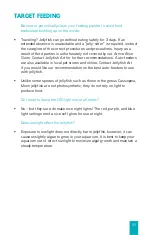
19
ORDERING JELLYFISH
It is important to allow time for your aquarium to complete the Nitrogen
Cycle prior to the introduction of jellyfish. There must be a way for the
aquarium to process waste and harmful chemicals produced from feeding
your jellyfish before your jellyfish can survive long-term inside. Please refer
to the Cycling Guide found on PAGE 14
.
Make sure a caretaker will be available to receive jellyfish shipment. The
caretaker has several hours after receiving jellyfish to acclimate them to
the aquarium, but it is best to start acclimation as soon as possible. Refer
to
Jellyfishart.com/apps/help-center#!scheduling-jellyfish-delivery
for
information about scheduling your jellyfish’s arrival date. Jellyfish Art ships
Moon jellyfish Monday through Thursday via FedEx Overnight or 2-Day
Express. Saturday deliveries require extra postage.
To redeem your jellyfish, go to Jellyfishart.com and click on the Redeem
Jellyfish header at the top of the page. Add the correct jellyfish package to
your cart, and then click “Checkout”. Coupon codes are able to be applied on
the Checkout page. Scroll to the code entry box and enter the unique coupon
code sent to you via email, then press Redeem. If you need assistance
redeeming or have any questions, contact us by phone at (844) 535-5900 or
by email at info@jellyfishart.com.
The ideal temperature range for moon jellyfish is 65 – 74°F.
There are many species of Moon jellyfish (Aurelia aurita) in the world. Our
particular Moon jellyfish thrive in both cool and warm water allowing them
to adapt well to most indoor environments. Their full temperature range
can be 60-78F. Most important to note regarding temperature is to avoid
temperature fluctions throughout the day, stable temperature is key!
Upon arrival, acclimate your jellyfish for at least 1 hour so that they slowly
adjust to the room temperature of their new home.
What happens when the temperature is over 78°F?
Jellyfish may begin to pulse very slowly. If left in warm water for several
days, shrinking, inversion, and disintegration can occur.
What happens when the temperature is less than 60°F?
Jellyfish become lethargic and pulse very slowly until they acclimate to a
warmer water temperature.




































